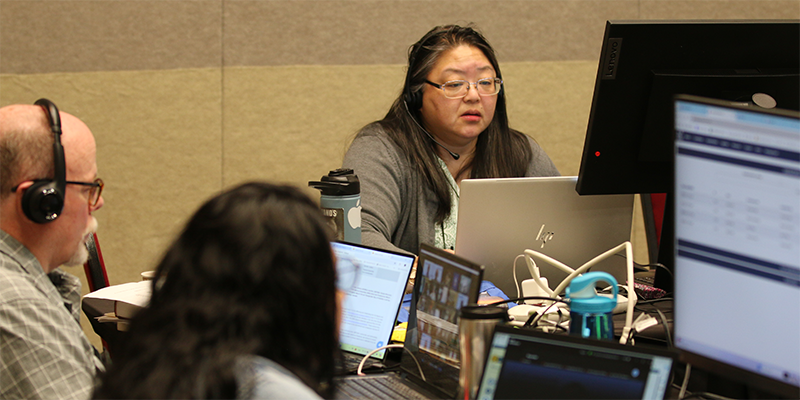
Lonna C. Lee, moderator of the Race, Sexuality, & Gender Justice Committee monitors the conversation on Day two of committee meetings. Photo by Randy Hobson

Lonna C. Lee, moderator of the Race, Sexuality, & Gender Justice Committee monitors the conversation on Day two of committee meetings. Photo by Randy Hobson
As the second day of work resumed Wednesday, Vice-Moderator Anthony Dawson of Foothills Presbytery led the consideration of RSG-04, a joint recommendation from the Advocacy Committee for Women and Gender Justice and the LGBTQIA+ Equity Advocacy Committee (ACQ+E) which recommends that the assembly direct the Presbyterian Mission Agency (or any successor agency) to recognize March 31 as Transgender Day of Visibility in all future printings and distributions of the Presbyterian Planning Calendar.
Concerns from some committee members over how this recommendation would be interpreted in congregations that hold traditional views regarding birth identity were met with deep care and discernment among committee members. One commissioner invited the group to consider all positions and reminded the group that issues regarding LGTBQIA+ have been debated for many years. Another commissioner on the other side of the debate shared her own struggles to understand transgender and nonbinary language.
TDOV, as it is often referred to, is a day to affirm the humanity and existence of those who are not readily seen, heard or valued. Trans advocate Rachel Crandall founded International TDOV in 2010. Crandall, the head of Transgender Michigan, created TDOV in response to the overwhelming majority of media stories about transgender people being focused on violence. The March 31 date was selected to have some clear distinction from the October date of Trans Day of Remembrance, which honors Black and brown trans people who were murdered due to their gender identity.
Advocacy Committee for Women and Gender Justice member Courtney Steininger expressed approval of this recommendation. “Just as womanist theologians Katie Cannon and Delores Williams speak of the suffering and survival of Black women, one of their most important theological turns is the redirection to seeking wholeness and joy,” Steininger said. “We know and trust that God did not create anyone to suffer but instead to live in joy.”
Those speaking in favor of the motion provided statistics on the suicide rate among youth as another reason to embrace and make a statement that all are welcome into the body of Christ.
With anti-trans legislation on the rise, advocates said that this is an example of living into the faithful witness of Jesus Christ. According to the American Civil Liberties Union, 479 anti-LGBTQ bills have been introduced in state legislatures this year alone.
Violence against trans people has been declared an epidemic by the American Medical Association since 2019. The violence disproportionately affects Black trans women, with a majority being young people of color. RSG-04 passed by a vote of 38-7.
That afternoon Moderator Lonna C. Lee, TEC, Presbytery of the Great Rivers, returned the Committee on Race Sexuality and Gender Justice to its work to perfect an alternate resolution to RSG-05, which addresses diversity, equity, inclusion and the realities of Hispanic Latino-a-e ministry.
Hearing concerns and the affirmative positions of the advisory committees, such as the Advocacy Committee for Women and Gender Justice, the Commission on the Unification of the Office of the General Assembly and the Presbyterian Mission Agency, and the General Assembly Committee on Representation, commissioners voted 42-2 to recommend the alternate resolution to the full assembly.
After a long day filled with emotions and expressions of the love for God and for God’s people, the committee ended their work with worship and communion, and adjourned with prayer.
